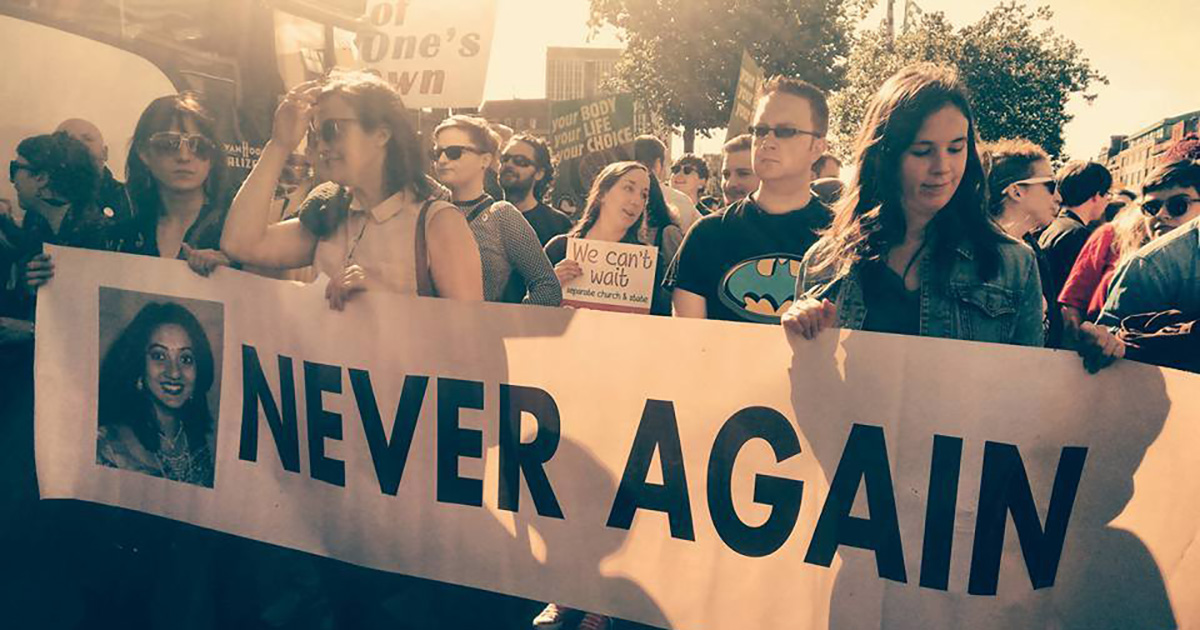ROAR
★ ★ ★ ★
MARCHING FOR CHOICE

By Lorna O’Hara
If one more person refers to how “progressive” Ireland is for voting in marriage equality and for having a gay prime-minister, I think I’m going to scream. It really isn’t difficult to scrape off the veneer of gleaming “progressiveness” that Ireland is now putting forward, and find the ugliness beneath. Ireland is a country that locks up asylum seekers in direct provision centres and gives them less than 20 euro a week to live on. It is a country led by a man who demonises the poor and calls them “welfare cheats”. It is a country with an ever-growing homelessness crisis exacerbated by greedy landlords and vulture funds and where 1 in 5 political representatives is a landlord. It is a country where a woman has no right to decide when, how and if she has a child.
But it’s also a country where there is a palpable atmosphere of anger among my generation and a strong desire for change. For Irish women, this change has been a long time coming. Ireland’s history of woman-hating politics and attitudes has haunted it for a very long time, and to this date it is one of the most glaring examples of inequality in our country. In fact a culture of misogyny is still reflected in Ireland’s deeply sexist laws. For example, Ireland is one of the only countries in the world where the woman’s place “in the home” is still enshrined within constitution.
Shocked? You shouldn’t be. Ireland doesn’t exactly have the best record when it comes to treating women well…or even treating women with a basic level of human respect or dignity. Ireland’s disturbing culture of woman-shaming is still alive and well. One need only look at the 8th Amendment (or Article 40.3.3 of the Irish constitution), still in place today, which equates the life of a woman with that of a foetus.
That’s right if you’re a living, breathing woman in Ireland, your life is equal to that of a small bundle of cells the size of this full-stop. Ireland has some of the strictest abortion laws in Europe.
Again and again, the archaic abortion laws in Ireland have done more than just fail women. Women have died, been put through torture both mental and physical, or have been sent off to the UK to be “dealt with” there. Between January 1980 and December 2014, roughly 163,514 women and girls travelled from the Republic of Ireland to access safe abortion services in another country (IFPA, 2014). And those are “the lucky ones” who can afford to or who are able to travel. The current abortion laws in Ireland are purposefully unworkable, making it difficult for doctors to know when they can intervene to save a woman’s life, as was the case with Savita Halappanavar who died in 2012 from complications of a septic miscarriage after being denied a life-saving abortion. And Miss Y, a young migrant woman who went on hunger strike after hearing she would have to give birth to her rapist’s child.
If you’re Irish, you’ve probably heard all about these prolific cases, but they always bear repeating, because it illustrates, in the starkest possible way, just how little the Irish government cares about women. We are brood mares and nothing more, forced to bear unwanted children, or even risk dying in the process of trying to bear much-wanted ones.
Abortion is a fact of life, it always has been. I guess it could be because of the generation I was born into, but this was something that my friends and I always accepted. Growing up in the early 2000s, the 8th Amendment wasn’t something that people talked about; indeed abortion was something that was still spoken about in a relatively hushed tone. But my friends and I had made pacts with each other that if we ever became pregnant and needed an abortion that we’d help each other get to England.
Before identifying as a feminist or activist, I already realised then that an anti-choice atmosphere only forces people to do things in secret and with the weight of stigma. When people say they’re not “pro-abortion”, they’re just shutting their eyes to the reality of the situation. Abortion is going to happen, whether you like it or not, and all the Irish government are doing is making it more dangerous, more difficult, more costly, more complicated and more stigmatised.
But we’re sick of it, we truly are. The past five years has seen an explosion of pro-choice activism among young women (and men) in Ireland. The mood has significantly altered at home—we no longer have to talk in hushed voices about abortion, instead we walk through the streets of Dublin in our “Repeal the 8th” t-shirts and can talk about abortion in the pub.
We have a national organisation campaigning for reproductive rights that actually has the word “abortion” in its title, something that would have been unthinkable a decade ago.
The March for Choice, now coming up on its 6th year, has grown exponentially each year. With over well over 20,000 people at last year’s march and this year’s promising to be the biggest yet. There’s even a global network of pro-choice Irish emigrants who are also campaigning in solidarity with those back home, many of whom will be hosting solidarity demos with the March for Choice on the 30th of September in London, Berlin, New York and even Melbourne. And most importantly, a referendum on the 8th amendment is actually finally on the cards, and is planned to take place next year.
Yet despite the renewed energy around pro-choice activism in Ireland right now, we can’t underestimate the massive struggle that lies ahead in the run up to the referendum. Obviously we’re no strangers to hostility, and there have already been plenty of attempts to silence and intimidate the pro-choice side. Furthermore, the anti-choice side are always on hand to sink to new lows. There’s something particular sinister about their tactics; the way they try to co-opt the language of actual activists fighting for social change and make themselves out to be the ones who are oppressed.
I don’t think anyone is operating under the illusion that this referendum is going to be anything other than a bitter struggle. Luckily pro-choice activists in Ireland have been preparing themselves for this fight for over 20 years, and as the slogan for this year’s March for Choice states: it’s time to act.

Lorna O’Hara is a doctoral student and feminist activist currently living between Berlin and Dublin. Her writing and research focuses on feminist activism and art, in particular similarities/differences between international feminist groups and artistic projects that have a focus on increasing awareness about/changing violence against women and the control of women’s bodies.























